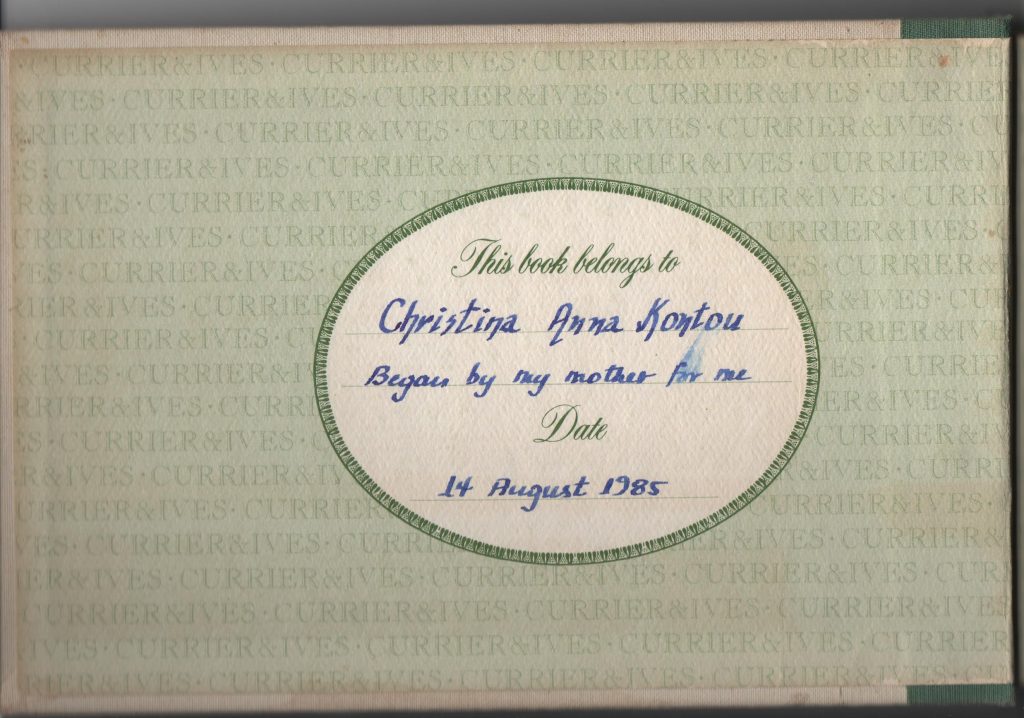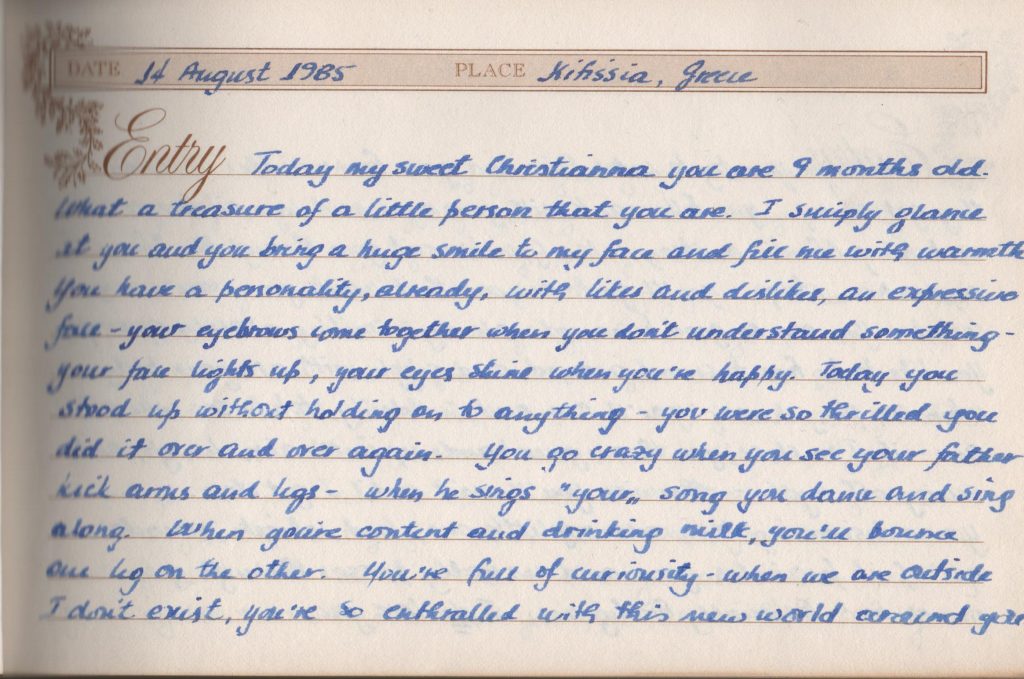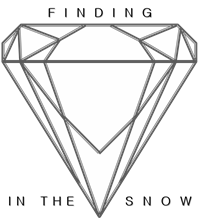
The dedication page of the journal
Today, my sweet Christianna, you are 9 months old. What a treasure of a little person you are. I simply glance at you and you bring a huge smile to my face and fill me with warmth.
You have a personality, already, with likes and dislikes, an expressive face – your eyebrows come together when you don’t understand something – your face lights up, your eyes shine when you’re happy.
These are the first lines of the journal that invigorated me when I felt hopeless, of the catalyst for this internet adventure, of the galvanizing force behind my 180-degree change in perspective. It was included in a chest of keepsakes given to me upon my mom’s death; Philip and I both received one. Each small, wooden chest was hand-painted by my mom. The lid features a dark room with a log-burning fireplace in the background and a wooden desk in the forefront; on the desk, a lit, white candle, set in a gold candlestick, a few title-less books, a piece of paper with squiggly lines in lieu of words, a blue inkwell with a feather pen sticking out and a scroll with my name written in Greek, “Χριστιάννα”.
When I opened my chest, I found items such as my christening outfit and other baby clothes, swimming suits, a Joni Mitchell CD, a Yianni CD (added years before the domestic abuse allegations appeared, I’m sure), report cards (All A’s! Ok, mostly A’s), some of my childhood drawings, my high school graduation invitation, university acceptance letters, my birth certificate and a journal addressed to me.
I couldn’t bring myself to read the entire journal for almost twelve years and when I dared to open it to a random page, I would only take in a few sentences at a time. Despite not having read it in its entirety, I knew that what I had before me was my mom’s greatest parting gift. Its value indeterminable. In my life, it exists somewhere between the tangible and intangible. To put it more accurately, it exists in the metaphysical. After reading it, after seeing myself in her words, after seeing my current world through her eyes, what was once an instinctive supposition, was now a verified fact.
What others’ may perceive as a commonplace item is anything but. When I step near the journal, pick it up and open it to a random section, a spiritual force awakens, the strength of which parallels the unstoppable might of natural disasters. The journal begins to elevate – much like the Beast when he transforms into the Prince – the pages rapidly flip open, the wind picks up, suddenly I’m at the center of a cyclone, a blinding light emitted from the ink, orchestral music blasting from the heavens; all my senses are activated and I can feel my heart beat against my chest with the same fervor a baby kicks the womb. And it is a lasting effect – the power of emotion – it motivates and inspires me, fortifies me against my fears, empowers me to be uncompromising in my values, to exhaust all options, to live unapologetically.
OK, maybe it’s just me. Maybe it is an experience reserved for me and for me alone. Much like many such gifts shared between people, they may have little market value, but are invaluable to the people involved. The way that a hug offers comfort, a gentle squeeze of one’s hand signals, “You’re not alone” and gives hope, or a “just-because” card makes you feel loved, this journal, this gift, contains more than the ink and paper of which it is comprised. I often think of the gifts my parents gave me: the love and emotional support, which seemed effortless, the non-negotiable high-quality education, which came in the form of schools and activities, as well as, an emphasis on reading and discussions at home, and finally, the moral foundation upon which they built our world. I do not exist without them. I am not me in their absence. The contents of this chest encapsulate the building blocks upon which I became me. Even though I was aware of this journal’s existence, I could not predict the effect it would have on me as an adult or the role it would play in rebuilding me when I felt cracked.
I don’t know if my mom could have predicted the journal’s effect either. Her decision to write the journal was informed by her own life and loss, especially the early death of her father when she was 20 and the relatively early death of her mother, when she was 28 and I was 6 months old. She began writing to me before she was sick, before just cause for concern had risen. The concern creeped up on all of us quickly though, at which point, the urgency to write down who she was skyrocketed. By the age of 34, she didn’t know if she would live to see 35 nor if she would live to raise her children. And because my mom was sick from such a young age, because both of her parents died before they turned 50, because life had proven to creep up on you when you least expected it, she was acutely aware of its ephemerality. By the age of 34, those blinders that develop as we go through life’s everyday-ness, the blinders that point us to the perfunctory tasks of waking up, living, sleeping and doing it all over again, had been forcibly and permanently removed. I imagine that there is no greater reminder of your own frailty, than nonchalantly running your hands through your hair, only to have most of it remain between your fingers.
So, in raising us, my mom was intentional in her actions, deliberate in every interaction with my brothers and myself. No event insignificant, no argument dismissed, no moment left to chance. She gave me – us – as much of herself as she could, leading through example and gently shaping us through her actions and words. This journal was merely the first step in actively imprinting herself in our lives. Verbally and in writing, my mother believed in the power of honest communication. I carry those words with me every day. Even before I had read my journal, I found myself having conversations with her in times of need and I’d invariably conclude that I’m bat-shit crazy – that suspicion, however, was not based solely on such ethereal conversations.
I guess we all have such talks, though. We all look to the people who love us for answers, for guidance, even if they are not with us. We are all probably at least a little bit bat-shit crazy. From my discussions with friends who have lost people they loved, lost family or friends to death, lost partners to breakups, lost a parental unit to divorce, lost friendships to egos, I find that we all search for those people we once knew, we search for their support, for their love, for their insight. We all search for that condition which was once our emotional norm, was once our sanctuary. Certainly, the circumstances of loss, the literal death of a person versus the figurative death of a relationship, makes a difference as far as how we relate to the loss, but at their very core, our emotional voids are comparable, if not identical:
Where there once was a person who loved, supported and cared for you, now there isn’t. Where there once was someone to lean on, now there isn’t. Where there once was a picture of your future life with them in it, now there isn’t. Where there once was one more person to remind you that you have worth, now there isn’t.
And it doesn’t matter how much she who we lost, loved, supported or cared for us. How sturdy she was when you leaned. How clear the picture of the future or how loudly she exclaimed of your worth. Because that’s what was real. The loss is analogous to each person experiencing it. The more profound the loss, the greater the chasm created within that individual. As human beings though, we all face a common struggle in replenishing that loss and filling-in our respective voids. The process by which we choose to restore ourselves is the determining factor of our existence. Because loss is a certainty and if every loss leaves a hole in your life, in your substance, in your being, how you choose to fill that hole, choosing to even attempt to fill it in the first place, is the only recourse to escaping emotional perforation.
I look at some people and think that their deep misery and anger is a result of such frequent, unchecked drilling, perforation so pervasive that you can’t distinguish which part is matter and which part is air. Lacking the tools, lacking the love, lacking the human connection to fill the void with substance, leaving it empty, susceptible to their own internal debris, or worse, external negativity. The tools, however, aren’t bestowed upon us at birth. Parents and guardians are responsible not only for providing food for the body and mind, but for enriching us with positivity, with love, with a sense of self-worth that will carry us through adulthood. My experience has been that most people’s self-worth and ability to recall their worth during challenging times, is directly connected to the kind of love they received growing up, linked to the emotional building blocks with which they were raised. Despite having received a lot of love growing up – the journal entries are but a preview of the type of unconditional, thoughtful and effortless love I received – I was still extraordinarily susceptible to my own self-doubt.

The first page of the first entry of the Journal
How grateful I am for all those who advocated my worth, before I knew I would one day have to do it for myself; how sorrowful I am that we live in a world where there are people born without such advocacy. How grateful I am for my mom’s greatest parting gift, not only because now we are peers and friends of a different sort, but also because I have a constant source of love, a reminder that I am worth that love, that I can be afraid without being deemed weak, that emotions live on beyond the physical, and that loss – all forms of loss – is an inevitable and bittersweet part of life, which needn’t define me, break me or isolate me. Loss may be one of the greatest binding agents, which allows us to relate to one another indiscriminately, leading us to strength and courage in unity.
